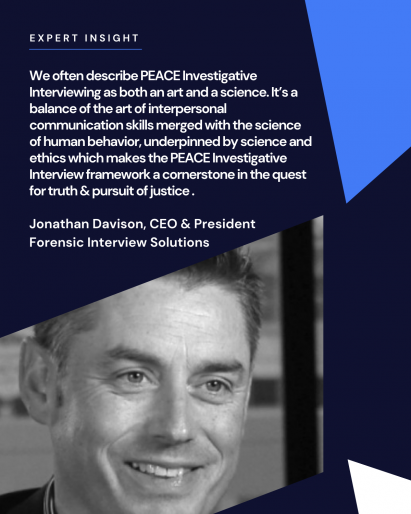Introduction
We often describe PEACE Investigative Interviewing, a method considered best practice in police & law enforcement training, as both an art and a science. It’s a balance of the art of interpersonal communication skills merged with the science of human behavior, underpinned by ethics that make the PEACE Investigative Interview framework a cornerstone in the quest for truth.
In this article, we will explore this blend of art & science in more detail & within the context of criminal justice.
The Art of Investigative Interviewing
Different to many interrogation techniques which often rely on pressure, psychological manipulation and coercion, investigative interviewing can be described as an art with interviewers refining & perfect their craft over time.
This craft is developed through the art of building rapport, practising active listening & creating an environment that encourages open communication.
Building Rapport
Rapport building is foundational to investigative interviewing, as opposed to more coercive interrogation techniques which disregard the need for building an open environment to encourage open communication.
It is also a demonstration of how investigative interviewing centers ethical conduct while pursuing the truth – a vital tenant of achieving trust within the community for law enforcement and regulatory agencies.
Active Listening
Rather than manipulating the direction of an interview towards the interviewers bias, the interviewer facilitates the conversation but does not lead or interject. The interviewee is encouraged & prompted to share their memory or information about an event through various scentific tools discussed below.
Cultivating an open & unthreatening environment
Cultivating an open and unthreatening environment is crucial to encouraging the flow of information. Whether in a witness, suspect or victim interview, creating an environemt that is unthreatening and comfortable creates space that encourages a more free flow of information exchange.

The Science of Investigative Interviewing
Complimenting the softer skills required for effective investigative interviewing is the ‘hard science’ of incorporating evidence based techniques and tools.
The science of memory recall
Memory recall is a critical factor in an investigation, but memory is fallable. Understanding how memory can be reconstructed, utilizing tools to facilitate the memory retrieval process as occurs within an investigative interview can make all the difference to the outcome of an investigation.
The power of open ended questions
In investigative interviewing, the emphasis placed is on fact finding as opposed to extracting a confession as typical of many older interrogation techniques. Key to the fact finding process is the ability to obtain information.
Asking open ended questions is key to enable the free flow of information necessary to establish the maximum facts within an investigation.
The Cognitive interview
Cognitive interviewing is a method that that is specifically designed to assist the recollection of information. It involves a few techniques such as changing the narrative order, which enhances the memory recall process.
The Conversation management method
Conversation management is a framework that guides the interviewee through an information gathering process, delivered in a structured yet flexible manner. The emphasis is on gaining the maximum information possible by facilitating the interviewees account, and then is followed with the interviewers questions & the interviewers summary of the account.
The PEACE Framework – An Intersection of art & science
PEACE Investigative Interviewing is an excellent example of an interviewing framework that blends both art & science.
PEACE is an acronym for Plan & Prepare, Engage & Explain, Account, Closure & Evaluation.
From a scientific viewpoint, the PEACE model is a structured model that incorporated scientific & evidence based techniques within the stages of the framework.
For examples, the “account” stage applies cognitive principles to enhance the memory recall process, by leveraging techniques like cognitive interviewing.
At the same time, the PEACE framework also incorporates the art of interviewing. As an example, in the “engage & explain” phase, the emphasis is on rapport building & creating an environment of trust that encourages open communication.
The “closure” stage includes a winding down and summarization of the interview which leaves the interviewee feeling heard & understood.
Conclusion
The PEACE Investigative Interviewing method epitomises how a blend and balance of both art & science are necessary for effective investigative interviewing.
The science provides the structure and technique & the art infuses the interview process with human understanding & a capacity for nuanced communication.
The artistry lies in the interviewers ability to blend and navigate through the stages and through the harder & softer techniques with skill and fluidity.
Investigative professionals can be trained in the FIS PEACE Investigative Interview Course which educates and trains the skill of the science & art of interviewing with the PEACE Investigative Interview framework.
FIS International are specialist trainers and consultants in PEACE investigative interviewing.
You can find information on:
- FIS® PEACE Investigative Training Schedule here: https://www.fis-international.com/training-schedule/
- FIS® On Demand Online Training Courses here: https://www.fis-international.com/services?filter=Online%20Courses
- More information on PEACE Investigative Information & free resources: https://www.fis-international.com/resources
Author: Jonathan Davison

As the President and CEO of Forensic Interview Solutions FIS® Jonathan leads a collaborative team of international experts specializing in P.E.A.C.E. investigative interviewing who have developed an international reputation delivering scenario-based training courses, consultancy, and solutions to public and private sector organizations across the world.
Jonathan had over 12 years Investigation and Interview experience as a Detective and in his last role with Greater Manchester Police, Jonathan was an Advanced Specialist Tier 3 Interviewer and a Qualified Trainer in the field of Investigative Interviewing.


